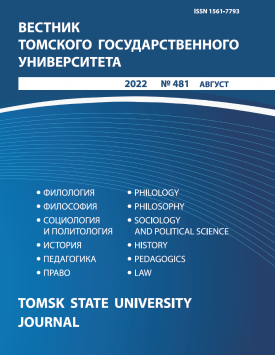German propaganda on the territory of the occupied Soviet Belarus: The reaction of the population and political sentiments in the historical and national context
The article deals with the problem of political sentiments and the reaction of the population to German politics and propaganda in the occupied Soviet territory (using the example of the General District of Belarus). The author explores the issue in the context of historical and national factors. The chronological framework of the study is the period from 1941 to 1944. The problem is investigated on the basis of documents from the state archives of Belarus, Poland and Russia. The author reveals the historical circumstances that determined the specifics of the mentality of the Belarusian population and its political sentiments under occupation. The author believes that the reaction of the population to German politics and propaganda was due to a number of objective factors. These include the multi-ethnic and multi-confessional nature of the population, a long stay in neighbouring states and the absence of their own national statehood, as well as the peculiarities of the occupation policy in the district. As a result, prudence, caution, apolitical, indifferent attitude to the institution of politics and power became the characteristic features of the national character of Belarusians. During the Great Patriotic War, it was these features of the Belarusian mentality that manifested themselves. Hence the passive, indifferent attitude to the change of power. The people, as usual, waited, guided only by a simple desire to survive. The Second World War was perceived as an event that affected the interests of Germans and Russians, and Belarus again became only an arena for military operations. Even the attempts of the occupation authorities to play on Belarusian nationalism failed completely. The political ambitions of the collaborators were largely limited to the projects proposed to Cuba for the “revival of Belarus” and its subsequent entry into the “New Europe”, while the occupation authorities did not specify in what institutional forms this should happen. Another specific feature of Belarusian mentality, which was formed in previous historical periods, but was clearly manifested during the Great Patriotic War, was the differentiation of Eastern and Western Belarusians into Orthodox and Catholics, as well as identification with Russians or Poles. At the same time, the reaction of the population of the district to German propaganda was characterised by a high degree of distrust and scepticism, since the content of propaganda materials sharply contrasted with reality. The “scorched earth” policy, methods of fighting partisans, the genocide of the peoples of Belarus, the practice of forced recruitment of Ostarbeiters - all this together levelled the efforts of German propagandists.
Keywords
mentality, political sentiments, German propaganda, General District of Belarus, Great Patriotic WarAuthors
| Name | Organization | |
| Pushkarenko Elena А. | Russian Customs Academy | pushkarenko-elena@mail.ru |
References

German propaganda on the territory of the occupied Soviet Belarus: The reaction of the population and political sentiments in the historical and national context | Vestnik Tomskogo gosudarstvennogo universiteta – Tomsk State University Journal. 2022. № 481. DOI: 10.17223/15617793/481/20
